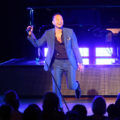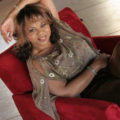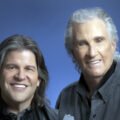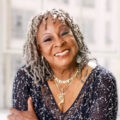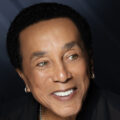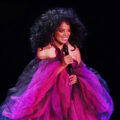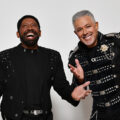Ruth Pointer & The Pointer Sisters “So Excited” for “An Evening Of Icons,” Credit Union 1 Amphitheatre
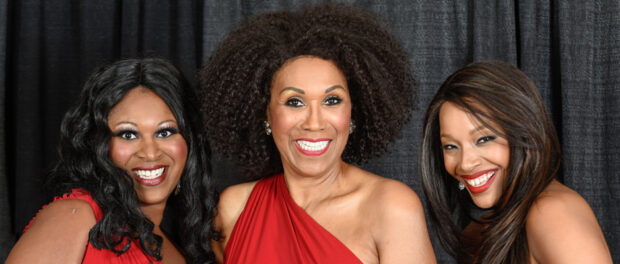 Photo provided by Scoop Marketing
Photo provided by Scoop Marketing
Editor’s note: Following the interview’s publication, “this show has cancelled due to unforeseen circumstances.”
It’s always been impossible to quickly classify The Pointer Sisters, who for the last half-century, have seamlessly slayed gospel, country, jazz, blues, pop, rock, R&B and Broadway with harmonies that could only be sent from heaven above.
Singles such as “Fairytale,” “Fire,” “He’s So Shy,” “Slow Hand,” “I’m So Excited,” “Automatic,” “Jump (For My Love)” and “Dare Me” are simply timeless, while the group is further immortalized on screens of all sizes thanks to “Car Wash,” “Sesame Street,” “Beverly Hills Cop,” “Oliver And Company,” “Saved By The Bell,” “Love Actually” and every aspect of “We Are The World.”
“An Evening Of Icons” is certainly a fitting title for their latest tour, especially considering it also features Motown’s leading men The Commodores and fellow soul greats The Spinners, all of whom will perform at the Credit Union 1 Amphitheatre in Tinley Park on Thursday, July 11.
Chicago Concert Reviews called co-founder Ruth Pointer to get an incredible history lesson on the leading ladies and how they were the very first to blaze trails across the Grammy Awards, the Grand Ole Opry, the San Francisco Opera and MTV in its infancy.
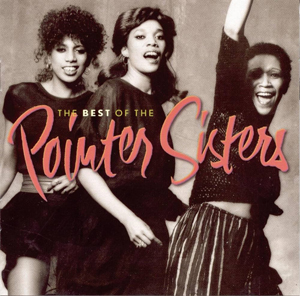 Does anything come to mind about performing around Chicago?
Does anything come to mind about performing around Chicago?
Ruth Pointer: We’ve always loved being in Chicago. It’s one of the great cities of our nation. I have a couple of friends there and I haven’t been there in a while, so yeah, it’s always a pleasure to come to Chicago. It’s so funny that we’re talking about Chicago. I’m watching “The Chi” and just getting into it.
We’ve done quite a few [shows there], I know that, but I can’t think of any one in particular. We’ve always had a great audience there. I guess the one that might come to mind is I think it was two years ago, we did a Christmas parade. I remember that because I was freezing my a** off (laughs). Oh my God, yeah, I remember that one!
I just thought about something else about Chicago that we used to love. Muhammad Ali used to live there, and whenever we would come there, he would seek us out, come and get us from the hotel, and keep us all day long, taking us to the mosque, parading us around and feeding us bean pies. So that was a wonderful memory and also [visiting with] The Staples [Singers]. Mavis, and her brother [Pervis], and her sister [Cleotha], they would always come to see us whenever we were performing in Chicago, so those were all other memories that have just kind of come back right now.
How would you describe The Pointer Sisters’ portion of “An Evening Of Icons”?
Pointer: Well, you know, we’re old school. I guess the only major thing that has changed a lot is who The Pointer Sisters are, the human beings. My sisters are all gone and it’s me, and my daughter [Issa], and my granddaughter [Sadako] that are carrying on, so I guess that’s the biggest change.
How much have you encountered The Commodores and The Spinners over the years?
Pointer: I don’t think we have a lot. We’ve done shows with a lot of the groups from that time. It’s just been one of those things that we did, from time to time, when we would be assigned to perform with other groups, mostly male groups: The Temptations, The Spinners, The Commodores, occasionally Earth, Wind & Fire. It’s always a pleasure to see these guys.
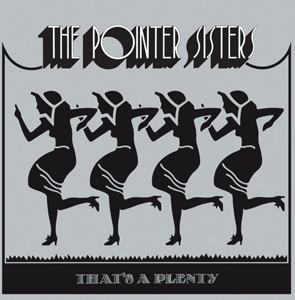 You’ve recorded so many styles of music over the years. How would you describe what built the group’s foundation?
You’ve recorded so many styles of music over the years. How would you describe what built the group’s foundation?
Pointer: When we started off, we were living in Oakland, California and commuting back and forth to San Francisco, and very much caught up in the whole San Francisco music scene with [concert promoter] Bill Graham, [producer] David Rubinson and those groups that were coming out of there, Sly And The Family Stone, and Tower Of Power, and Taj Mahal. It was very exciting during that time. Everybody pretty much recorded at Wally Heider [Studios] or down in Sausalito at The Record Plant and it was very exciting because you would go into the studio, and you would see these big cases of the other groups with the name of the group on it. I always felt so proud when we became a part of that whole thing.
But our music is diverse, I guess you could say as we were, because our family roots come from Arkansas. We were sort of country-based and had parents that were ministers that moved during the Great Migration from the South to Oakland, California. My dad pastored a church there in Oakland for twenty-some odd years. The music scene was really evolving during the time we were growing up, from country into blues and rock and roll, and we just wanted to fit in because our childhood was very restricted with the parents that we had. We just fell in love with music as a whole and gospel music was something we loved. They used to have midnight musicals at the Ephesian Church Of God In Christ in Berkeley on Sunday nights. You talk about some singing and musicians, I mean it was off the chain, Lord, with choirs from all over the country! I remember one night going there and Billy Preston was just 19-years-old playing the organ for these different gospel groups that consisted of…Andraé Crouch, Sandra Crouch and Shirley Caesar. It was exciting for me cause I loved it and we just absorbed all of these different rhythms of music being caught up in that and the San Francisco music scene.
When David Rubinson decided to take us on as a group and manage us, we wanted to sing everything and he was very much grounded in jazz at the time. We were like, “okay, we’ll do that too,” but we also wanted to sing some [other] things of course. Particularly at that time, Anita and Bonnie were doing a lot of writing, and that’s when they wrote “Fairytale,” the country song. I remember the band not wanting to play it when we were getting ready to record it and it was like, “Oh, come on guys, just play the song!” It ended up being something that we’re most recognized for as being the first Black group to get a Grammy for a country song. We didn’t even realize we had won a Grammy because we were so busy on the road, working so hard…
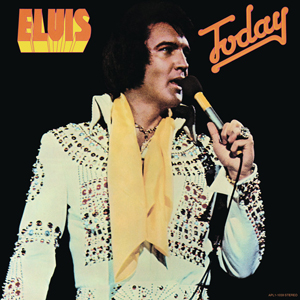 In addition to making Grammy history, what do you remember about being the first Black female group at the Grand Ole Opry?
In addition to making Grammy history, what do you remember about being the first Black female group at the Grand Ole Opry?
Pointer: Oh God, yeah, we were the first Black female group to perform at the Grand Ole Opry. I don’t think we were the first Black artist, definitely the first [Black] female artist. We were honored to do that. We traveled to Nashville. I think we were already on the road and the night that we went to perform at the Grand Ole Opry, the people really didn’t know we were Black (laughs). They had planned a party for us, supposedly to honor our coming into country, and when we arrived at the party, they came rushing out to the car to bring us in the house and they brought us around the back. We’re thinking, “okay, we’re gonna surprise everybody,” and we were back in there so long in the kitchen, my manager, who was in the front of the house with the guests, came back and said, “What are you guys doing back here?” And we’re like, “They brought us in the back cause we thought we were gonna surprise everybody.” He said, “No, they know you’re coming, but they think you’re the help. That’s why they brought you back here.” Oh yes (laughs). Me and my sisters were like, “what the f?” (Laughs) Oh yeah…That was kind of like our introduction to it (laughs). Whooo!
The performance was wonderful, and country people, if they like you, they let you know it right there while you’re on stage. My sister Anita used to always…introduce singing “Fairytale” in our live shows [and a] guy in the front row stood up and said, “God damn, them girls is Black! (Laughs) And he said, “Sing that song again!” And we had to sing the song like two or three times in a row. They didn’t care that it was the same song. “Okay, strike up the band. Let’s do it again. They want to hear it again!” Yeah, it was quite a memorable time.
How did you react when Elvis recorded “Fairytale”?
Pointer: Can’t get no bigger than that! We were shocked. We were like, “Oh, okay, well let’s go” (laughs). We had always been Elvis fans ever since we were kids. My mom loved Elvis singing “Crying In The Chapel.” Some of the first records that I ever bought as a teenager were by Elvis Presley, you know, I’m “All Shook Up,” so yeah, we were fans from the very beginning.
What was it like as The Pointer Sisters’ star continued to rise throughout the early 1970s and how did you continue to evolve as the decade progressed?
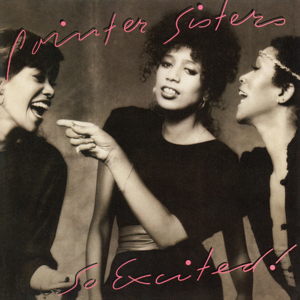 Pointer: It was just very exciting. It was challenging. When I look back on those years, every once in awhile I will play some of those old tunes, like “Cloudburst” and “Little Pony,” and I go “Damn, those were some hard songs.” Because there was nothing like social media is today, I remember having a record that I put on the record player and slowing it down so that I could learn the lyrics to these songs and then speeding it back up so that I could record them with my sisters. We were in rehearsals everyday learning these jazz songs with a pianist and it was a lot of work. We were so green we didn’t even understand that it was work. We were just having fun, and when it came time to go on the road, those were the songs we were singing.
Pointer: It was just very exciting. It was challenging. When I look back on those years, every once in awhile I will play some of those old tunes, like “Cloudburst” and “Little Pony,” and I go “Damn, those were some hard songs.” Because there was nothing like social media is today, I remember having a record that I put on the record player and slowing it down so that I could learn the lyrics to these songs and then speeding it back up so that I could record them with my sisters. We were in rehearsals everyday learning these jazz songs with a pianist and it was a lot of work. We were so green we didn’t even understand that it was work. We were just having fun, and when it came time to go on the road, those were the songs we were singing.
Things started to develop as we were traveling on the road because we weren’t doing a lot of record sales at that time. People would come to see us, I think, out of curiosity because a lot of people didn’t realize we were Black girls, especially in the country, in Nashville. But people [in the industry] would come to see us and they would go, “I don’t know what we’re supposed to do to your songs because they’re so jazz-oriented and so different than things were used to hearing as far mainstream R&B or rock and roll. But when we come and see your live show, it is on fire and we love you guys.” I think that was like the beginning of a time when we felt like we needed to make a few changes so that we could sell some records. I mean we wanted to make a living. We didn’t want to live on the road. Anita and I both had children and we were thinking, “We need to do some adjustments in our style so that we can sell more records and we don’t have to travel so much.” So slowly, our style started to evolve a little more into contemporary pop, mainstream, for survival and things just sort of evolved from there.
Bonnie decided she wanted to go on her own in 1976, so that left me and Anita with June. We thereafter met Richard Perry, who was starting a new record label, [Planet Records], and decided to take us on as his first act. We were in sync [with] Richard about wanting to make some changes in our style, which ended up being a good decision because that’s when we came into songs like [covering Bruce Springsteen’s] “Fire” and “Slow Hand.” Me and my sisters ended up writing “I’m So Excited.” We recorded “Jump (For My Love)” and so many other tunes that were in the mix of us evolving into a different style.
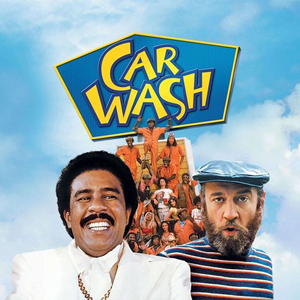 Can you tell us a bit about branching out into the acting world around then when it came to the movie “Car Wash”?
Can you tell us a bit about branching out into the acting world around then when it came to the movie “Car Wash”?
Pointer: That was a lot of fun because it was the almighty Richard Pryor and so many other actors that have gone on to do great things in film. Some of them aren’t even with us anymore, but wow, that was an experience that I’d never thought we’d be having, singing a song written by Norman Whitfield, “You Gotta Believe,” and just being able to be a part of what was going on. I just remember filming at that car wash every day and having so much fun with all the other characters. I’ve had and have a wonderful time in this industry looking back on the things that me and my sisters have accomplished.
In what way did the “Break Out” album live up to its title and really catapult you to superstardom by the mid-80s?
Pointer: We had just really connected with Richard Perry, who is an amazing producer, and we had already done, I think, a couple of albums with Richard, “Energy” and “Priority.” We were still kind of searching and experimenting on a lot of music to fit us because we were so versatile, but we did want to have a definite, I guess, genre of music. I don’t know that we were really trying to be R&B. I guess we were leaning more towards pop and rock because June was always a big rock and roll fan. Anita was always country. I love country and Bonnie was just everywhere, more blues and jazz. We just really wanted to do something different, but still be able to fit in.
You know, music was changing so fast during that time and there were just so many different options available. We were just kind of caught up in the progression of where music was going, coming out of the ‘60s, into the ‘70s, just starting to get into a little rap and all that, so “Break Out” was exactly that. We ended up getting “Automatic” and “Neutron Dance.” Me and my sisters wrote “I’m So Excited.” That album seemed to capture what we were really trying to do, so it was such a proper title. Then to have Eddie Murphy, who was doing “Beverly Hills Cop,” want “Neutron Dance” in his film, that was it, and Lionel [Richie] taking us on his first solo tour. We were like, “Okay, this was a good decision. We love the title of the album and let’s go. Let’s break out.”
The Pointer Sisters also played a significant part in helping launch MTV. How did you feel about videos and in what ways might you have helped set those trends?
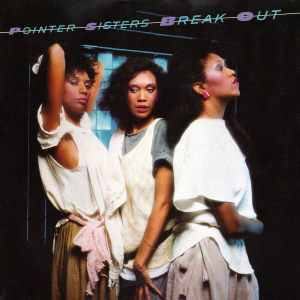 Pointer: I remember when videos first started emerging in the music industry and people weren’t really sure about where it was gonna go. I think we were either the first or one of first female groups to do an MTV video and there weren’t a lot of Black artists on MTV at all. It was an experiment when I think about it. At that time, a lot of people weren’t sure what the concepts were gonna be. When we would pick a song to do a video, usually it would be a song that we would have out as a single, sometimes it just didn’t make sense when one of the creative people would come around to put together a concept for the song. Sometimes it just didn’t merge together, you know? They wanted to be creative, but we always wanted it to connect with the lyrics of the song, so it was really kind of a trial and error period. It was very much so in the experimental stages of where these videos were gonna go. I think it slowly evolved into the greatness that it became with the Michael Jackson videos and different ones like that.
Pointer: I remember when videos first started emerging in the music industry and people weren’t really sure about where it was gonna go. I think we were either the first or one of first female groups to do an MTV video and there weren’t a lot of Black artists on MTV at all. It was an experiment when I think about it. At that time, a lot of people weren’t sure what the concepts were gonna be. When we would pick a song to do a video, usually it would be a song that we would have out as a single, sometimes it just didn’t make sense when one of the creative people would come around to put together a concept for the song. Sometimes it just didn’t merge together, you know? They wanted to be creative, but we always wanted it to connect with the lyrics of the song, so it was really kind of a trial and error period. It was very much so in the experimental stages of where these videos were gonna go. I think it slowly evolved into the greatness that it became with the Michael Jackson videos and different ones like that.
Speaking of Michael Jackson and basically every other major star of that period, what are your thoughts on being part of “We Are The World”?
Pointer: It was one of the greatest times in our career, for sure, but we didn’t know it at the time. We were so busy on the road. We were just coming off of a tour and went straight into the American Music Awards. Lionel came backstage in our dressing room and said, “look we’ve got this song” that him, and Bob Geldof, and Quincy [Jones] had worked on with Michael. “We want you guys to show up over at A&M Studios after you leave the awards.” They figured that was a good time to do it because all the artists were already there at the awards show, so they had gone around to everybody and asked them to come over. We said, “Okay, we’ll come over there and do the song.” It was for a very good cause, you know, hunger [relief].
Walking into the studio with the banner across the top of the studio door saying, “leave your ego at the door” and walking in there with all these peers of mine, that was mind-boggling. Like I said, we were just coming off of a tour ourselves, so we were tired, and we had to go in there and learn a new song with everybody else. I guess you could say it was like one of the biggest, almost like a high school reunion party that you could imagine (laughs). When I look back sometimes, when they show clips on television occasionally, and I see myself up there, I go, “Girl, whew, what a night that was!”
What do you consider to be any other defining moments for The Pointer Sisters?
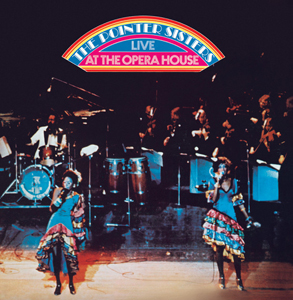 Pointer: I think one of the things that I love remembering is probably when we were the first contemporary act to play at the San Fransisco Opera House during the beginning of our career. I remember that my mom, my dad and my grandmother were at that show, and the four of us were together, me and my sisters. Being in San Francisco is like our hometown stomping grounds and a lot of people that we had gone to school with were in the audience. It was such a special show. We were still wearing vintage clothing and coming on stage one at a time, like runway supermodels we thought, before we would jump into that fast-paced song “Cloudburst.” That’s one of the defining moments for me that I remember because it was definitely the last time that my grandmother was able to see us. She was getting up in age and we were just starting out. Yeah, that was one of my favorite memories.
Pointer: I think one of the things that I love remembering is probably when we were the first contemporary act to play at the San Fransisco Opera House during the beginning of our career. I remember that my mom, my dad and my grandmother were at that show, and the four of us were together, me and my sisters. Being in San Francisco is like our hometown stomping grounds and a lot of people that we had gone to school with were in the audience. It was such a special show. We were still wearing vintage clothing and coming on stage one at a time, like runway supermodels we thought, before we would jump into that fast-paced song “Cloudburst.” That’s one of the defining moments for me that I remember because it was definitely the last time that my grandmother was able to see us. She was getting up in age and we were just starting out. Yeah, that was one of my favorite memories.
How do you hope your sisters who are no longer with us will be remembered?
Pointer: I just hope that they will be remembered for the accomplishments that we had. I know that it’s so special to me because me and my sisters didn’t have any professional music training, other than singing in a choir in my dad’s church where we really got our grounding for the different parts of music, like soprano, and alto, and bass, and tenor. But people were always surprised when they would call us into the studio to do background vocals for different people, Helen Reddy, Taj Mahal, Dave Mason [Traffic], Grace Slick [Jefferson Starship], and we would tell them, “We don’t read music.”
All four [of us] had this amazing ear for clarity of a key, or a note, and to be able to just memorize how to sing harmony together without reading any music. We knew what the other sister was going to be singing, like where our voices fit in with each other. I was always the lowest voice. June was always the highest voice. Anita and Bonnie were always in the middle, so we knew that about each other. It was instinctive. We didn’t even have to rehearse it or think about it. It was amazing and we didn’t even know how amazing it was at the time. When I think about it now, like singing with my daughter and my granddaughter who don’t have that quality, I go, “damn, I didn’t realize how special that was” cause we didn’t have to rehearse a lot. Me and my sisters hated rehearsal. We were like, “We know what we’re gonna sing, so let’s just get it done.”
Give us a little taste of what we can expect from the current line-up.
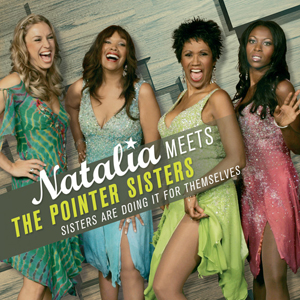 Pointer: They’re young, for one thing. I enjoy the fact that they bring a youth element. They do a lot more dancing than I do now these days (laughs) and they have a little bit of a different style, so I guess I would have to be the nostalgic part of it and they are the offspring. I was eight months pregnant with my daughter at Carnegie Hall and now she’s on stage with me. My granddaughter was born while I’ve been touring, so it’s really all they know about me and we just have a lot of fun together. I love being with them. We have a party in the dressing room before we ever get on stage and it’s a good time. It just kind of keeps me alive, and keeps me going, and keeps me wanting to just do what I do, and love what I do, and I’m sure my sisters would be very proud to know that I do it.
Pointer: They’re young, for one thing. I enjoy the fact that they bring a youth element. They do a lot more dancing than I do now these days (laughs) and they have a little bit of a different style, so I guess I would have to be the nostalgic part of it and they are the offspring. I was eight months pregnant with my daughter at Carnegie Hall and now she’s on stage with me. My granddaughter was born while I’ve been touring, so it’s really all they know about me and we just have a lot of fun together. I love being with them. We have a party in the dressing room before we ever get on stage and it’s a good time. It just kind of keeps me alive, and keeps me going, and keeps me wanting to just do what I do, and love what I do, and I’m sure my sisters would be very proud to know that I do it.
My sister Anita, I was with her in her last days, and she would often look at me and go, “I don’t know how you’re doing it” (laughs). I haven’t always been confident about the thought of doing it…I have to say my husband is probably my biggest fan who always inspires me when I start feeling like I’m getting a little shaky about something I might have to do, like when my sisters aren’t signing with me anymore, and he’ll say, “Honey, you got this. You can do this.” I get up there and I’m amazed when the audience responds or even that they show up. It humbles me when they just show up and I think, “Wow, they still want to come.”
What are the future plans for The Pointer Sisters beyond this tour?
Pointer: You know, I have no plan really. I’m just gonna go one day at a time and do what I can, as long as that audience continues to show up. As long as I can stand on these old a** legs I got, I’ll try to do what I can. I often think about all my peers that are still out there, Patti LaBelle, Diana Ross, Cher, and when I see they’re still out there, I go, “Okay, let me try to see if I can still be out there too!”
The Pointer Sisters perform at the Credit Union 1 Amphitheatre on Thursday, July 11. For additional details, visit ThePointerSisters.com and LiveNation.com.

